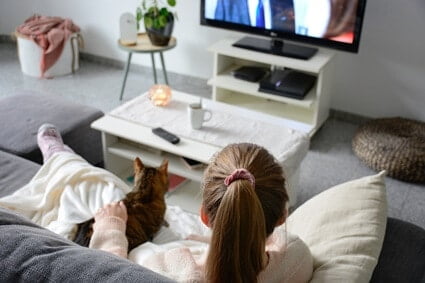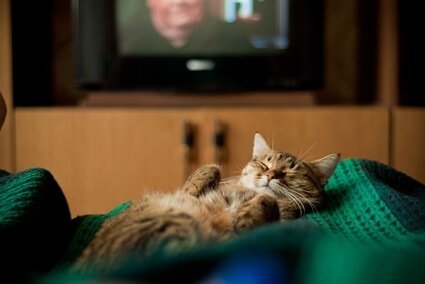Cats are curious creatures that are highly responsive to visual cues and interesting sounds. They require mental stimulation, which is what television provides cats.
Some cats love watching TV. Their brains process images much faster than ours, so they see television screens as a flicker, piquing their interest. Cats with a strong hunting drive are more likely to watch TV. They believe animals are in the same room as them, but this can cause behavioral problems if you leave the TV on all the time. Cats are more drawn to the sounds than the picture televisions produce, particularly if they hear animal sounds.
While many cats enjoy watching TV, most prefer to watch life through a window, where they can see real-life birds and animals. You might be tempted to leave the TV on while you go out, but if your cat has a strong hunting drive, it may scratch the TV to get to the animals, risking an accident or injury.
Do Cats Enjoy Watching TV?
Cats enjoy visual stimulation because they’re visual creatures. As mentioned, they respond to visual and vocal stimuli, which sharpens their cognitive function and improves their senses.
However, not all cats enjoy watching TV. Some are fearful of the noise and moving pictures and will avoid any room where a TV’s turned on. Others find it soothing and fall asleep in front of the screen, acting disinterested in what’s actually playing. Cats that enjoy watching TV do so for the following reasons:
Mistaking TV for A Window
Many cats spend hours perched on a windowsill watching the world go by. Because they respond so strongly to visual stimuli, cats enjoy watching TV, particularly if there’s something on the screen that piques their interest, such as birds and other animals.
TVs are similar to windows, especially when animal programs are playing. Cats can view TVs from afar and lie down in front of them, providing a sense of relaxation and calm before they fall asleep.
Curiosity
Cats are curious by nature. Kittens, in particular, are fascinated by TVs and enjoy watching moving pictures. Curious kittens explore the television with their paws and sniff around the back of the device to find out where the sounds are coming from. Many cats lose interest when they grow up, but some maintain their curiosity around televisions.

Strong Hunting Drive
Cats that have a higher drive to hunt are more likely to enjoy watching TV. Their attention gets captured by changing colors and movements on the screen because they believe the animals are actually in the room with them.
Some cats paw at the screen because of this strong hunting drive, believing they’re able to stalk and catch the animals. This can be a source of frustration for cats that like to get hold of their prey. Others enjoy it as a fun game, but they can become too invested in what’s on the screen.
Time With Owners
Some cats watch TV because they see their owners do it. Many families sit down to watch TV together, encouraging cats to join in with the fun. Cats bonded with their owners enjoy spending time with them, and watching TV provides the perfect opportunity to do that. They’re not even necessarily watching the screen but are having fun relaxing with their favorite people.
Alleviate Boredom
If your cat’s bored, a TV’s an exciting way to pass the time until something more exciting happens. Cats enjoy contemplating what’s around them, and watching fast-moving images on the TV can help entertain them. Similarly, old cats or felines with health issues can’t indulge in exercise, so TVs are an excellent alternative entertainment source.
What Do Cats See When They Watch TV?
If you’re wondering what TVs look like to cats, the answer depends on the cat’s intelligence, age, and ability to perceive color and depth. Cats most commonly see the following things:
Color
Scientists believe that cats see the world like a desaturated photograph. As described by Semantic Scholar, cats need good vision to:
- Hunt
- Avoid dangerous situations
- Interact with other cats
However, they don’t see hues and saturation very clearly because they don’t have as many cones as humans. This means they don’t see rich or clearly defined colors. But while they don’t see in technicolor, the images they see are similar to what we see.
Cats also don’t see finer details. Instead, they have a tapetum, which is a reflective layer in the retina. The tapetum reflects light and bounces it off the cones. This is what’s responsible for a cat’s advanced nocturnal vision, meaning it’s unlikely that cats can appreciate the colors on a TV screen.
Depth Perception
Scientists don’t currently know how cats perceive the images on a TV, so we only have theories to go by. Instead of complete images, cats see edges and outlines of the people and animals they see on the screen.
Similarly, cats see flickering because their brains move faster than the images being played. American Veterinarian explains how cats process images more quickly than humans at 70-80 Hz, so the faster the pictures, the more intrigued cats are about what’s on the screen.
For context, humans require around 20 frames per second or more to see smooth, clean movement on a TV screen. Cats need about 100 frames per second for the same experience.
Newer vs. Old TVs
Because cats process images faster, older, standard 50Hz TV sets appear as a nonsensical flicker that cats can’t perceive. Modern TVs with a 100Hz picture frame rate display images that are less blurry and more interesting for cats to watch.
To explain how this works, TVs don’t display a moving video but a series of continually refreshing images before a new one appears. Human brains can’t process them quick enough, making the pictures look seamless and smooth. Newer TVs have a higher refresh rate, which means the images change quicker, creating more movement.
To a cat’s eyes, stills on an old TV look like a series of flickering pictures. On a new TV, they look far more convincing, piquing their interest more effectively.
That being said, cats rely more on their hearing to understand the world around them. It’s likely they simply see the flicking, fast-moving images but are drawn to the sound of a TV.
Bright Screen
TV screens slightly blind cats. That’s because their eyes are built to see in the dark. Even by our standards, screens likely look excessively bright, especially when the settings are turned up.
However, cats can contract their pupils to restrict the light, minimizing the effects of the light. Whenever your cat’s in the room with you while you watch TV, try not to have it on too bright.
Do Cats Understand TV?
Cats don’t have the mental capabilities to understand what a TV is. They see colors and movements, but most cats can’t distinguish what’s on the screen from real life. Cats that have never been around TVs before will find it even more difficult.
Because of this confusion, some cats lash out at the TV screen. They may also see their reflections in the glass, mistakenly believing there’s another cat in the room.
Cats are also confused by the sound of the TV. Their hearing’s designed to pinpoint where their prey’s located, so the sounds are likely to stress them out if they can’t see where they’re coming from.
Do Cats Like the TV Left On?
Whether cats enjoy the TV left on or not comes down to their personality. Some owners believe that leaving the TV on while they’re at work is an effective way to soothe and entertain cats left by themselves, offering them a source of company to prevent loneliness.
Cats with separation anxiety benefit from listening to the sound of a TV or radio. Separation anxiety occurs when cats can’t bear to be away from their owners, making them stressed.
According to the Journal of the American Veterinary Medical Association, inappropriate elimination is the most significant warning sign of separation anxiety. Others include:
- Excessive grooming
- Crying and vocalizing
- Eating too fast or not at all
- Destructive behavior
- Over-excitement when owners return home
Some cats like the TV on when home alone, but others are scared and agitated by the sounds and moving pictures. If your cat’s not used to having the television on, it’s better to switch it off when you’re not at home.
Similarly, if your cat has strong hunting skills, the TV’s more likely to intrigue them, as mentioned. However, depending on how playful your cat feels, there’s a risk it could lunge at the television while you’re gone. Because you cannot stop this behavior, your cat could knock the device over or cause an injury. Safer ways to entertain your cat while you’re gone include:
- Hide treats and toys for your cat to find
- Leave out a couple of scratching posts in various sizes
- Set up a pet camera that allows you to talk to your pet
Why Do Cats Scratch TV Screens?
It’s a problem when cats start scratching at TVs. Most modern televisions have fragile screens that show up even the slightest scratch. There’s also the risk that your cat could knock the TV over. Cats scratch televisions because:
- They see their reflection in the glass
- The pawing gets your attention
- They see a mouse or bird on the TV screen
- A noise from the TV triggers their hunting instincts
- They’re attracted to the warmth and shininess of the television
Some cats naturally stop pawing at the TV after a while, while others develop a bad habit that gets worse over time. To prevent your cat clawing at the TV:
- Provide a scratching post and place it next to the TV
- Play with your cat using toys and games
- Cover the TV with a blanket or sheet when it’s turned off
- Prevent access to the room your TV’s in
What TV Shows Do Cats Like?
Cats react most favorably to videos featuring birds, mice, and fish. The best kinds of cat videos and shows come with sounds to further pique their interest. YouTube is the best place to go to find cat-friendly TV shows, including:
Do Cats Like Watching Birds on TV?
Eight Hour Bird Bonanza is an eight-hour-long video that documents various birds eating birdseed at different outdoor locations. Because the birds fly so rapidly in and out of the screen, cats will be transfixed by the sudden movements and chirping, allowing them to feel as if they’re outside amongst nature.
Bird videos provide plenty of mental stimulation and sharpen their senses. However, if your cat seems frustrated by the experience, turn it off.
Do Cats Like Watching Mouse Videos?
Like bird videos, videos of mice are bound to be popular with cats. Mouse action is a 14-minute video showing various mice eating some delicious seeds. It comes complete with squeaking sounds, so your cat’s ears will pick up the moment you turn it on.
Do Cats Like Watching Fish Videos?
Not all cats are as fascinated by fish as birds and mice, but Catching Fish is a one-hour video of fish swimming from a bird’s eye view. Because they rapidly swim on and off the screen, this video captivates attention and entertains cats for the duration of the video.
Do Cats Like Watching Cat Videos?
This is up for debate, as territorial cats are likely to become angry by the appearance of another cat on screen, particularly if it can’t understand that the cat’s not in the room. Most cat videos are a source of stress, regardless of how comically your cat reacts.
When you put a video of a cat on, your cat’s likely to start hissing and becoming aggressive. It may also begin eliminating inappropriately to mark its territory.
Is Watching TV Bad for Cats?
There’s not enough research to determine whether TV’s harmful for cats. Vets agree that there are rarely any adverse side effects, but more studies are needed to know for sure.
While there aren’t any known medical side effects, too much TV can cause behavioral problems, such as destruction, scratching, or bad behavior. The experience differs from cat to cat, and some are more affected by television than others.
Is TV Bad for Cats’ Eyes?
Watching TV for extended periods can cause your cat’s eyes to become fatigued. It shouldn’t hurt your cat’s eyes to watch TV, but you should turn it off every now and then to give them a break and minimize the risk of eye strain.
Is Too Much TV Bad for Cats?
Regular television viewing is fine as long as your cat gets plenty of exercise by going outside or playing with toys and games. If watching TV is all your cat does, you have a problem, and you’ll need to mentally and physically stimulate your cat by turning off the television and interacting with it as much as possible.
Is Loud TV Bad for Cats?
Loud TV is a problem for cats, as it can cause psychological stress. Cats’ eats are highly adapted to pinpoint prey. This means they’re sensitive to noise. Nervous or anxious cats are most affected by loud TVs, but excessive noise is detrimental to all cats.
Excessive noise causes hypertension (high blood pressure). Cats will hide or run away from home if they’re too spooked from a loud noise.
If your cat’s exposed to noise levels above 95 decibels for prolonged periods, they can develop hearing damage. For context, according to the University of Michigan Health, this is equivalent to a shouted conversation. The average TV is 75 decibels, but it could easily reach 95 if it’s turned up too high.

Can Cats Become Addicted to TV?
It’s rare for cats to become addicted to TV. Cats with a higher prey drive seem to become more engrossed in what’s on the screen, which can make it seem as if they’re addicted.
However, if your cat constantly meows at the TV screen, it may be having trouble separating television from reality. In this case, try distracting your cat by playing with it using its favorite toys. Watch out for any obsessive or concerning behaviors, such as:
- Increased vocalizations
- Excessive grooming
- Pawing at the TV screen
- Sitting next to the TV
If you suspect your cat’s obsessed with the TV, you must wean it off the device to prevent unwanted behaviors.
Why Doesn’t My Cat Watch TV?
It’s normal for some cats to ignore TV completely. Cats prefer to watch what’s going on outside. They’re attracted to wildlife, which they’re more likely to see through a window than a television screen. TV and electronic audio are designed for human ears and eyes. This is another reason why some cats don’t respond and ignore the television.
Similarly, cats with sight or hearing difficulties won’t be as bothered by the TV because it doesn’t offer enrichment or stimulation. Cats that don’t understand what’s going on may be more fearful, ignoring the TV because they don’t like what they see or hear.
Why Do Cats Watch TV but Dogs Don’t?
Cats see slightly more color than dogs. For dogs, television is no different from reality. That’s because they have dichromatic vision, which means they see everything in yellow and blue.
Similarly, dogs’ cone cells are believed to blur their vision. Dogs require 70 frames per second or more to detect movement. In comparison, cats need 100, as we’ve already mentioned. As a result, dogs see most TVs like a strobe light or flipbook, which isn’t very interesting to them.
However, not all dogs ignore the TV. A study published by Science Daily explains that dogs can pick out pictures of other dogs using only visual clues. Dogs are drawn to the same species of dogs when they appear on screen more than anything else.
Likely, they’re not bothered by anything else on TV, which is why they don’t bother watching, but they will react if they see a similar dog on screen.
While it’s safe for cats to watch TV, monitor your pet to ensure it doesn’t become addicted or misbehaved due to too much visual stimulation.

